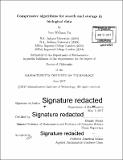Compressive algorithms for search and storage in biological data
Author(s)
Yu, Yun William
DownloadFull printable version (18.59Mb)
Other Contributors
Massachusetts Institute of Technology. Department of Mathematics.
Advisor
Bonnie Berger.
Terms of use
Metadata
Show full item recordAbstract
Disparate biological datasets often exhibit similar well-defined structure; efficient algorithms can be designed to exploit this structure. In this doctoral thesis, we present a framework for similarity search based on entropy and fractal dimension; here, we prove that a clustered search algorithm scales in time with metric entropy number of covering hyperspheres-if the fractal dimension is low. Using these ideas, entropy-scaling versions of standard bioinformatics search tools can be designed, including for small-molecule, metagenomics, and protein structure search. This 'compressive acceleration' approach taking advantage of redundancy and sparsity in biological data can be leveraged also for next-generation sequencing (NGS) read mapping. By pairing together a clustered grouping over similar reads and a homology table for similarities in the human genome, our CORA framework can accelerate all-mapping by several orders of magnitude. Additionally, we also present work on filtering empirical base-calling quality scores from Next Generation Sequencing data. By using the sparsity of k-mers of sufficient length in the human genome and imposing a human prior through the use of frequent k-mers in a large corpus of human DNA reads, we are able to quickly discard over 90% of the information found in those quality scores while retaining or even improving downstream variant-calling accuracy. This filtering step allows for fast lossy compression of quality scores.
Description
Thesis: Ph. D., Massachusetts Institute of Technology, Department of Mathematics, 2017. Cataloged from PDF version of thesis. Includes bibliographical references (pages 187-197).
Date issued
2017Department
Massachusetts Institute of Technology. Department of MathematicsPublisher
Massachusetts Institute of Technology
Keywords
Mathematics.